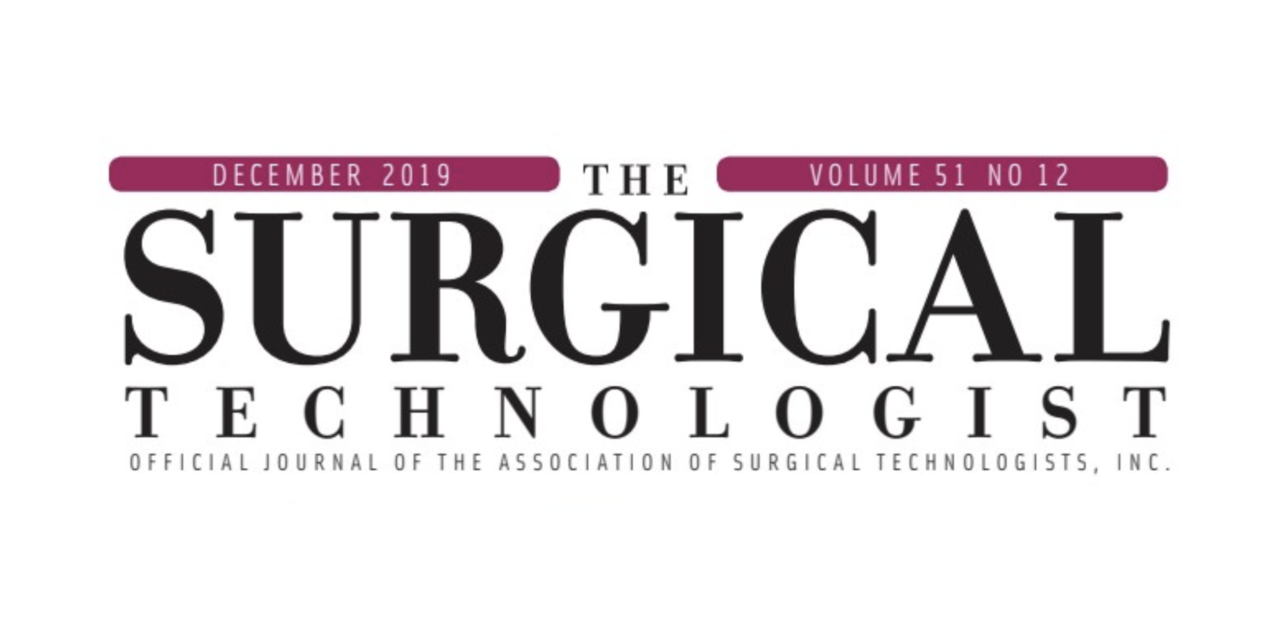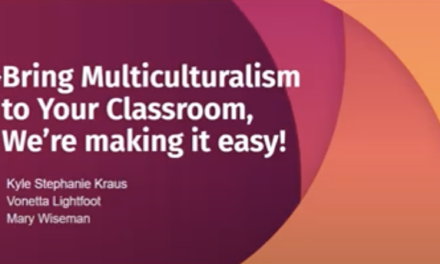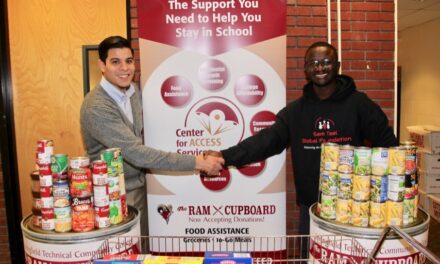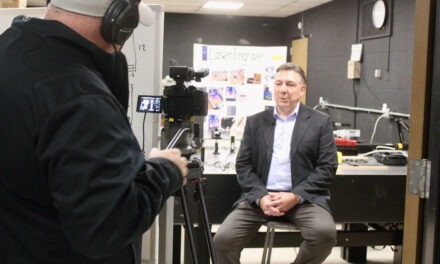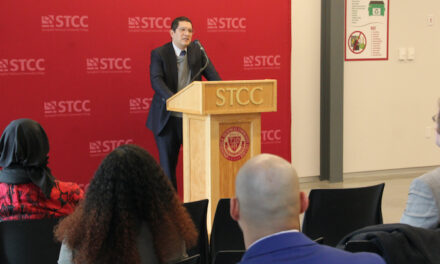(This article by Kathleen Sawtelle, instructor and academic counselor of clinical education in Surgical Technology at Springfield Technical Community College, originally was published in the December 2019 issue of “The Surgical Technologist” magazine)
In my 42 years as a surgical technologist, I have had the opportunity to work in every specialty there is, in both large and small hospitals. The work is always new and exciting. Everyday someone or something will forever leave an impression on me. These life experiences are what shape us into the person we become as we continue to evolve into who we are each and every day.

In my most recent endeavor, I had the honor to be part of the first Sam TaalMedical Mission to The Gambia in Africa. I had the lucky fortune of meeting Fams Taal at work one day. Fams, a graduate of the respiratory program, was visiting with his former professor discussing the idea of putting together a group of people to go on a mission. It was then that I heard about this medical mission trip and threw my hand up in the air, “I want to go!” The thought of this journey scared me to death but excited me even more. To be part of a medical mission was a lifelong dream of mine. Fams had a vision to build a clinic in Tankular, where he is from, in his father’s memory. He knows first-hand that the people of Tankular have no medical facility nearby. They have to walk about 20 miles for an aspirin, or any type of medical treatment, in deplorable conditions.
To make this dream come true, Fams started fundraising selling medical apparel or hosting fundraising events. He raised money any way he could. We all collected donated goods or items we bought ourselves. The Sam Taal Global Foundation has been fundraising for two years to see this mission come to life. The clinic is still being built: the walls are nearly complete, but no roof as of yet. As a result, we knew upon our arrival that we would be working out of the school in the village as a temporary clinic.
Our journey started on Sunday, June 17, 2018, at 6:45 pm as we boarded the plane at New York’s JFK Airport headed to Brussels, Belgium, then onto Senegal, Africa, and lastly to The Gambia, where we finally arrived at 5:40 pm on Monday, June 18. Dr Njie, a local doctor, with whom we would be working with, met us when we landed.
He was instrumental in helping us navigate through customs as we had 11 pieces of luggage, six of them full of medication, not to mention all the school supplies and clothing we shipped months in advance by barge. We rented a house near the airport in Banjul, and on Tuesday we caught up on some much-needed sleep despite the neighborhood’s roosters best attempt to wake us. We watched in amazement during our first morning there as the local people went about their daily lives, going to and fro with their bicycles, donkey carts carrying loads of cement, some on foot, and others in cars and trucks.
Children were walking down the street to the main road to wait for transportation to take them to school. The women walked by wearing beautifully fitted colorful outfits. Some of the women walked by with a basket of goods on their head. And among all the people walking were cows, donkeys, goats, pigs, monkeys, cats and dogs.
Wednesday we were up and out early to make our way to the village of Tankular. Before we were allowed to treat the people of Tankular we had to receive permission from the dignitaries in that area. We met first with the director of regional health services, Sutay Drammeh, and went around the room introducing ourselves.
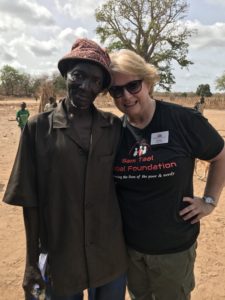
Fams spoke for everyone in regard to our plan to treat the people of Tankular. Dr Njie and the local medical mission team members were with us as well. With permission granted to us by Sutay, he joined us as we went on to meet Governor Fanta Samateh. The protocol was the same as with our meeting with Sutay. She thanked us for coming and for offering her people medical care in our destination, the village of Tankular, where Fams still has family. Fams came to the USA as a young man. Fams had put together an amazing team of people for this medical mission. The team consisted of family and friends who took care of the logistics. They were our translators, drivers, cook and security, and now our friends. The journey from our house to the village of Tankular would be about two and a half hours long with good paved roads. However, our daily com- mute could take us as long as four and a half hours each way due to the roads and our vehicle situation. We first traveled down a two-lane road where the speed limit was 60 miles per hour. There were bicycles, cars, buses, pedestrians and animals all in the road at the same time. It was very congested and there were no traffic lights. The drivers use their horns constantly to warn other vehicles, pedestrians and animals of their whereabouts. Along this road were police checkpoints that you are required to stop for. They asked the driver for their license and registration, also what their business was and to check out the passengers. These checkpoints were every few miles. The air was heavy with the scent of diesel fuel due to no emission regulations.
The next stretch of road we traveled was a dirt road for many miles. The smell of the dirt permeated the air as the dirt and dust was everywhere. These roads are extremely bumpy and hard to navigate causing the driver to drive extremely slow adding precious time to our daily commute. This road winds through little villages scattered about. You would see children at play, women working the fields or pumping water from the communal well for their daily needs. The men were gathered under the shade of trees solving the issues of the day. Lastly, we traveled down a tiny dirt road we lovingly referred to as the goat path because it was so narrow and virtually impassable for any speed above a crawl. If we were in anything other than a trunk, our vehicle bottomed out on all the dirt roads. We went through three vehicles during our two weeks of commuting.
As we approached the village, we saw the African flag blowing in the breeze to our left and the American flag to our right. What an incredible site to see! The school children lined both sides of the dirt path singing as we approached, “Welcome from America. Thank you for helping us!” The entire village population came out to greet us. They sang and danced. The older school children carried signs they made thanking the Sam Taal Global Foundation for coming to help them. In the midst of all this was a celebratory dance being performed by a village gentleman to welcome us. We all gathered for a formal celebration. The elder men sat in the front row, followed by the younger men, then the women and children. Each elder got up to welcome us, thanking us for coming to help them and for giving them hope. They could not thank us enough.
When we arrived the next day at the clinic, the line of villagers waiting to be seen weaved along the side of the school and extended behind it. We had two nurses working in our triage room. I was responsible for dental classes for all ages. When I asked a class of children how many owned a toothbrush, there was maybe one hand that was raised. After the lesson, we handed out toothbrushes and toothpaste and dental floss for all. I was also responsible for wound care, skin care, and eye exams so that they could be fitted for reading glasses. A respiratory therapist did rescue inhaler breathing treatments, up drafts, anti-smoking classes and dental exams as needed. Most villagers had dry irritated eyes and respiratory issues due to the dry dusty conditions.
Dr Njie saw all the patients as well and prescribed the medications they need- ed. We all helped out at the pharmacy table filling the prescriptions. We treated many conditions such as prenatal wellness, check-ups, hypertension , COPD, respiratory issues, fever, head colds, infections, skin rashes, toothaches, parasites and open wounds. During the week we saw patients as they came in for medical attention, men, women, and children. On Saturday we held a children’s clinic so that those who hadn’t been seen could receive care without missing school. We treated more than 700 patients and started charts on them all for future follow ups.
It was just a matter of two days before the children called us by name. Each day they met us at our vehicles upon our arrival. They would ask for empty water bottles so they could fill them up with water to bring to school. We handed out headbands, sunglasses, flip flops, balloons, school supplies, and clothing.
The children asked for something every day they saw us. They even asked for footballs which we did not have. Next time we will have to send some toys over. Our focus was clearly on their needs. One boy who was barefoot received a pair of flip flops from us. We saw him later that day carrying them, he said he was saving them for a special occasion. He did not want to get them dirty.
The people of Tankular had a closing ceremony for us on our last day of the clinic. The elders got up and thanked us for our time and for traveling so far on their behalf. They offered prayers for our safe travel home and asked that we please come back. We had a chance to talk with all of them and thank them for making us feel so welcome. Regardless of our language barrier it was obvious we were communicating with each other. I was not prepared for the flood of emotions I felt for the people of Tankular. The compassion, love and support they showed us all was overwhelming. It was hard to say goodbye to everyone. When they asked me to stay, I said, “It is with a heavy heart I leave you, but I will be back.”
The next day the elder men came to our house from the village to thank us again. They gave us handmade dresses, handmade jewelry, a certificate of appreciation and offered prayers. They could not have been more thankful. We gave them much-needed medical attention and hope. They now know we care and we will be back. We continue to fund them and send much-needed medications.
I left the USA making my way to The Gambia with the mindset that I’ll do one mission trip and be done. I thought I could cross it off my bucket list. I was afraid to travel so far from home, and I feared for my safety as I was going well out of my comfort zone. But I could not have been more wrong. Everywhere we went I found people to be gracious, helpful, and thankful. The people of Tankular have deeply inadequate systems in place, but we were able to made a huge difference in their lives if only for a while. We provided health care and hope. I know we made a difference in their lives as we were the first medical mission to go to Tankular. I know my life is forever changed. We are now connected through friendship, commitment and our hearts. I told the village people I will be back and that is the first thing I said to my family when I arrived home. This is what I’m meant to do. I am so thankful for the opportunity of this life-changing experience.
Interested in studying Surgical Technology at STCC? Visit stcc.edu and click on programs to learn more.

